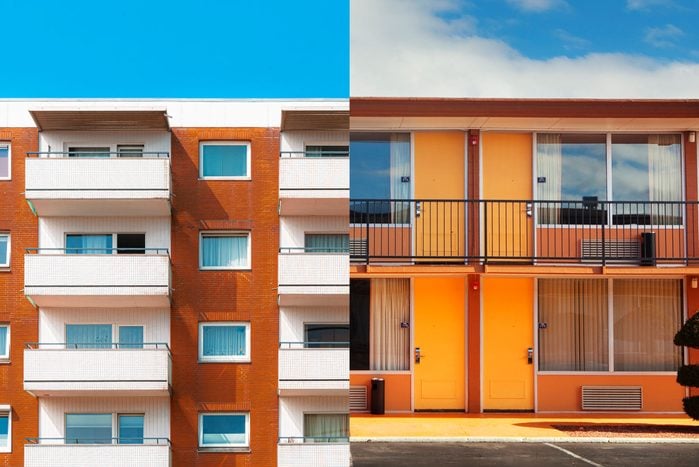This Is the Difference Between a Hotel and a Motel
Updated: Jan. 25, 2024

In the motel vs. hotel showdown, which wins for your vacation? Here's how to tell them apart and determine which is right for you.
Whether you’re looking for a quick hotel in the city, an inexpensive gem for a cheap family vacation or a secluded resort in the tropics, where you choose to stay can make or break your vacation experience—especially if you’re traveling on a budget. Figuring out where to stay is dependent on so many things, from the length of your trip to your thread-count preference, but one choice has to be made before all others: motel vs. hotel.
The most seasoned travelers may know the best travel apps, the best time to book a flight and even how to travel for free (knowing the best credit card for travel rewards helps!). But they may not be aware of the difference between these two accommodation options, although they’re the two main types of homes away from home. Besides the first letter, what is the difference between hotel and motel? Don’t worry, this isn’t one of those secrets hotels won’t tell you, but the answer isn’t as simple as you might think.
Get Reader’s Digest’s Read Up newsletter for more travel, humor, cleaning, tech and fun facts all week long.
What’s the difference between a hotel and a motel?
These two types of lodging have the same basic purpose—providing a place for travelers to crash—but there are plenty of features that make for a big difference in the motel vs. hotel debate. Hotels are defined by their large size (often multiple floors) and connected offerings, such as restaurants, bars, conference rooms and business facilities, gyms, pools, spas and even stores. These are often open to the general public as well as guests.
Hotel guests tend to stay multiple nights (or sometimes even months). To accommodate their needs, hotels employ large numbers of staff, including concierges, porters, cleaners, chefs and whoever puts those chocolates on our pillows each night (our personal favorite). Generally speaking, if you’ve walked into a lobby, asked the concierge about visiting local hidden gems or taken an elevator to your room, you’re in a hotel.
Motels, on the other hand, tend to be smaller and are designed for quick trips—think one to two floors and one to two nights. Facilities tend to be more basic, and you can probably park right outside the door to your room. There might be a pool, but there’s probably not a fluffy white robe in your closet to wear on the walk down to it.
Yet the lack of extra staff and amenities makes motels a much more affordable option than hotels. And on a road trip or long journey, a motel can be exactly what you need.
The history of hotels
The word hotel dates back to the 1600s and comes from a French word, hôtel (pronounced with a silent h, of course!). Just like the English word, hôtel refers to a place that provides lodging, meals, entertainment and other services to travelers. It’s the kind of place you expect to book in advance, rather than simply showing up.
Modern hotels in America were born out of the railroad age, when trips between different cities accelerated like never before and more people began to travel for pleasure. Large, luxurious hotels were built close to railroad stations, which were often centrally located. You’ll find a lot of them near airports today for a similar reason. Whether you’re flying first class or a budget airline, you’re bound to find a hotel near your destination.
This type of lodging generally falls into one of three categories: transient, resort and residential. Transient hotels are centrally located in urban areas. Guests who stay here aren’t permanent residents—they are, well, transient. During their brief stay, they want to enjoy room features such as a private bathroom, television and Wi-Fi, and services such as laundry, room service and shoe shines.
Resort hotels are usually located near ski slopes or beaches, and they lean toward the luxurious (although it’s definitely possible to stay in cheap beach hotels). They may be all-inclusive, meaning that all or some meals are included in the price.
Residential hotels are for longer-term guests, such as business travelers who expect to stay several weeks or months. Here is why it is advised to put luggage in the hotel bathroom!
The history of motels
Motels, on the other hand, are a much more recent—and very American—lodging option. The term dates back to the 1920s and combines the words motor and hotel. As America’s major highway system developed through the ’50s and ’60s, so did motels, filling the need for roadside stops for motorists driving cross-country and looking to travel on the cheap.
That’s why parking spaces take pride of place for a motel vs. hotel—it’s all about the comfort of both car and driver. You’re unlikely to book a motel in advance (unless you’re super organized!) and will probably just pull into the nearest one when you get tired of driving. Motels tend to be located near or on interstate highways, and they’re more informal than hotels.
At a hotel, a bellhop may handle your baggage, but at a motel, you’ll most likely be schlepping your own luggage to your room. That room probably opens right out to the parking lot or to a balcony overlooking it. If you’re lucky, it’ll be overlooking the pool—almost like a cheap beach vacation!
In the motel vs. hotel showdown, both facilities are dominated by chains, but hotel chains often look different across the country and world, tailored to their location. Motel chains, on the other hand, tend to look the same wherever you are. A Motel 6 in Arizona and a Motel 6 in Maine are pretty much interchangeable, which can be comforting at the end of a long day of driving.
Hotel vs. motel: What’s the difference?
| Hotel | Motel | |
| Cost | Generally more expensive than motels (over $100/night), but the price varies based on size, star rating, amenities, room type and location | Most often cheaper than hotels (under $100/night) but with many fewer amenities and more basic rooms |
| Stars | Hotels range between 1 and 5 stars in quality, with 5 being celebrity levels of luxury and 1 being almost equivalent to a motel | Motels generally don’t have star ratings, but on travel sites, they’re often listed as 1- to 2-star facilities |
| Location | Near airports, urban centers and resort locations like ski slopes and beaches | Usually located in rural areas or on city outskirts and often found alongside interstate highways or on scenic routes |
| Property amenities | Lobby, restaurants, bars, a gym, pool, business facilities, spa and room service | Often a pool and sometimes restaurants or a continental breakfast room |
| Room amenities | Mini-fridge, minibar, safe, TV and Wi-Fi, hair dryer, towels and toiletries, comfortable bed, reading lamp, desk and safe | Basic toiletries, bedding, towels and sometimes a hair dryer |
| Brand examples | Marriott, Sheraton, Comfort Inn, Radisson, Best Western, Hyatt, Four Seasons, Hilton, InterContinental, Ritz-Carlton and Holiday Inn | Motel 6, Econo Lodge, Knights Inn, America’s Best Value Inn and Super 8 |
Cost of a motel vs. hotel
Properly budgeting for your trip can make or break how much fun you end up having, and that’s true whether you’re planning a cheap spring break trip or a visit to New York City’s hidden gems. Accommodations tend to be one of the biggest costs, so if you’re deciding on a motel vs. hotel, taking the price per night into account can help. In general, hotels tend to be pricier, but other things—such as size, popularity and location—can have a bigger effect on cost than the motel vs. hotel distinction.
In the end, whether motels or hotels are better comes down to what you want from your trip and from your lodging. Want the place you stay to be just as much a part of your travel experience as anything else? Need to be located in the heart of things? Opt for a hotel. Just need a place to pop in and out of to shower and sleep? Intending to drive rather than walk? A motel might be the better choice.
Before you book anything, though, check out the best places to travel this year.
Sources:
- Vacayholics: “Understanding the Basic Difference Between a Hotel and a Motel”
- Skyscanner: “Hotels vs. motels”
- Revfine: “Hotel Star Rating System”
- Britannica: “Hotel”
- Britannica: “Motel”



